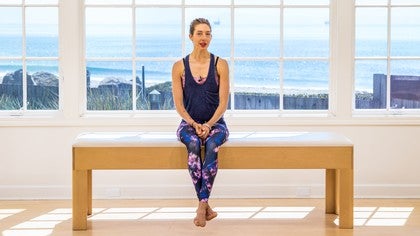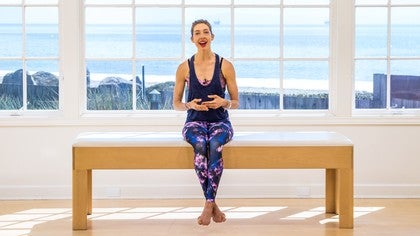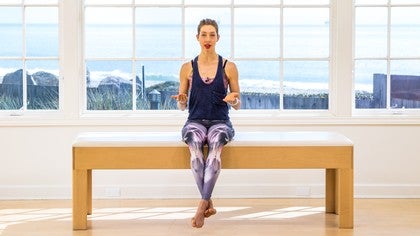Description
The Pilates Method Alliance offers Liability Insurance for instructors. Find out more information here.
About This Video
Transcript
Read Full Transcript
Chapter 1
Introduction
Hi, I'm Lisa Logan and this course you've graduated. Now what we'll cover all the things that you need to have ready, where you can work, how to build your business and continued education. Please enjoy and if you have any questions let me know.
Chapter 2
Working For Someone Else
Hi, I'm Leslie Logan and I'm so excited that you finished your pilates teacher training. Congratulations. This is a really awesome time for you. One that you're probably so excited to celebrate and then super nervous about what to do next. I remember when I finished my training program, I actually had no idea what I would do.
The program I went through was an amazing foundation, but I couldn't teach there. So where could I teach? And that's what I want to go over with you today in this course. Let's get started. All the places you can go in teaching [inaudible] it's kind of the whole world. Um, there really is no limit into where you can teach Palladia.
So you just have to decide what works best for you. We have a few options that are very popular, which is working for a studio and that has an employee that could be a more corporate type environment and also can be a single owner studio. You can rent space at a studio which means you're really working for yourself but under an umbrella of somebody else who's doing some work for you or you can open your own space in your house, a brick and mortar. So those are the three most popular ones that you can decide to do and let's talk about each one. Working for someone requires you to be as professional as you can.
Be. Understand that they have a brand that they're putting out there in the world. When you work for a studio owner, you will most likely do an interview. Interview is a two way street. It's them entering, viewing you with questions and find out who you are and what you like as an instructor and who you want to be. But it's also you interviewing them and seeing is this the right space for me?
Is the plots that they offer here. Some that vibes with me because there are so many types of [inaudible] that you want to find one that you fit in best. You don't want to set up shop somewhere and then feel like you're the odd person out and you're teaching something that's not being taught by other people and it just doesn't work for you. Or for the studio owner. When you go and you do this interview, ask them questions. What are their busiest times? When are they going to need you? What shifts, uh, should they, should you have available?
And also find out a little bit more about the types of clients that they have. Are they a class space studio? Is it a private base studio? How are they getting new clients and how are you getting them clients? It's really important that you are all on the same page before you step foot in the door and work for them. When you work for someone, they will have a set rate that they charge their clients and then you will get paid a certain rate. Usually when you're teaching. Now, something you should understand when you work for someone is that they do all the heavy lifting. They've opened the studio doors, they've bought all the equipment, they have done all the marketing, the website, they've done everything, made every decision. And you may or may not agree with those decisions, but they have done all of that and this is their baby and you're working for it.
So you only have to really come in, do an amazing job and go right so you won't make as much money as they're charging. And you need to know that right away, especially as a new instructor, you may want to be paid $100 an hour as if that's what they're charging the client, but they have to pay for all the overhead of getting that client in there. And so you'll get a portion of that as you grow as a teacher, your knowledge, your experience, your client base, and they see what you have to offer. There may be potential for growth and that's something you should talk about with them at the very beginning. So you know what your path is and that everyone's very clear. Another part of the interview process when you go to work for a studio is they'll usually have you do a practical and what that means is you'll simply teach a session just like you would teach anyone and you'll be nervous.
I mean you're on an interview so of course you will be but it's important that you do the best you can to teach the body that's in front of you and show them the type of teacher that you are with all your personality and all of your knowledge. To recap when working for someone, be prepared to do a two part interview, one that's in person where you're both asking questions. Also where you do a practical part in, you show the knowledge you have as a teacher and what you have to offer their studio. Understand that you may not make as much as they are charging. In fact you won't make as much as they are charging and that is something you have to understand since they are doing all the heavy lifting and also that you should be the awesome self that you are so you can learn and teach and grow under the umbrella of someone who has done so much that they also have a studio that's available
Chapter 3
Out on Your Own
if you want to go out on your own there about two options for you to do. We talked about that in the beginning. You can rent space, which is where a studio owner lets independent contractors come in and run their own business essentially in a studio similar to some hair salons, right?
You can rent a little studio section. Um, but instead you have the whole studio that you get to use at your, well the other way is to open up your own space and you can do this in your own home. Maybe have a carriage house or an extra bedroom, no, that that means people are coming into your space and that might be something that you're not comfortable with the others to have a brick and mortar, which is a standalone studio where you rent out an actual space, fill it with equipment, design it decorated, all of those things. When you rent space, it is a little bit, you don't have all the studio decisions to make, but you still have all the business decisions to make for yourself. Who are you going to teach? How are you going to market yourself? How are you going to get clients? That studio has done a lot of marketing to make themselves stand out in a crowd, but they might not have clients to just give you and you have to figure out how am I going to get my own clients and rent out this space?
Generally you will have your own insurance and it will work with their insurance. You will have an interview in that. They need to know that they can trust you with the keys to their space. You may not have to do a practical and you may not have to think of is the vibe of the studio something that I'm interested in because again, you're running your own space and so you get to decide when you teach and what kinds of clients you teach and how you offer plots to the world. You'll pay rent and that will be discussed in the contract with the studio owner and you'll have certain expectations that you'll have to meet. It's important that when you meet with a studio owner and you're about to rent space, that you understand exactly what's expected of you when you come into the studio, teach a session and go because you don't just get to teach and walk away and hope the cleaning elves come in.
You generally have to treat that space as if it's your own studio. You just don't have og again, all that heavy lifting to do. You don't have to make all those major decisions, but you'll still want to have a website and you'll still want to market yourself. We can talk about all of that another day. Another way you can work for yourself is again, to open your own space. Now, this takes a little bit more leverage. You'll have to have some capital to start your own business because buying equipment does not just grow on trees. No one's just going to give it to you.
So if this is something you want to do, you'll definitely want to make sure that you understand all the decisions you have to make and that they're going to be growing pains and not just, I have all this money I've spent and now I have to have clients. I'll come in, but months and months of hustling out there to get clients to find your studio and then a couple of years of just figuring it all out. That doesn't mean don't do it. In fact, in your area, you might be the only person, so do do it. It just means understand that working for yourself is not the easiest thing in the world and it doesn't hurt to grow as a teacher in the beginning. By working for someone and understanding what it takes to be a studio owner and what it takes to be a teacher that's successful. But if you're opening your own space, whether it be in your house or out in a brick and mortar, you do want to make sure that you understand how you can recoup your costs.
So when you pick prices, you don't want to pick what the neighbors have without thinking about how am I going to pay the rent here? And then also where I live, how am I going to pay for the insurance and the equipment? How do I make money? So when you go out on your own, there's a whole list of questions you'll have to ask yourself and be prepared to answer a little different than working for someone or renting space. All three options are really amazing. When you finish your program, you'll have to have a few things ready.
Chapter 4
What You Need to Have Ready
One is your own insurance. Now, if you work for someone or a corporate environment, they'll probably have insurance that covers you, but it's not a bad idea to get it yourself.
It's also one of the least expensive things you'll do as a Palladio's instructor when opening your own business. I recommend going to the potties method alliance website and seeing their insurance options. It's Polonius method alliance.org just check it out and you'll want to go there anyways because the next thing you should have ready is going through the PMA exam. Technically, you're not really a certified instructor until you've taken this exam and it's important just to be professional and be legitimate and also authentically say you're a certified instructor to go through the PMA exam. And another reason why this is really amazing, besides all the plies instructors you're going to meet, when you go to their events and you're checking out their website, there's lots of options and workshops for continuing education. You can grow as a teacher in that environment and that's what you'll want because right now you have a strong foundation.
The next thing you want to have ready as a website, I know you probably have all your social media handles set aside. Even thinking about the name of Your Business and a website is a cost that you'd might not want to spend right now. But the truth is you don't own any of those handles all the people who own them do. And it is a great way to interact with your environment. But if it's 11 o'clock at night and I'm on Google and I'm searching Pilati is in your area, a website that you come up in is what I'm going to find. And so you simply need to have even just one page that says who you are, whom you're for, where they can find you, and how they can set up a session.
It's not too much and I highly recommend you get that ready. You can even start getting that ready while you're in your program. So day one, when you graduate, you're all set to go. You may be wondering how long does it take to build the business? Well,
Chapter 5
How Long Does it Take to Build a Business?
no matter who you work for, yourself or a studio owner, get ready to have that hustle muscle ready. You've graduated, you're excited to teach, but not every studio is waiting with open arms. And lots of clients to hand to you. You may get hired at a studio and then show up for your first shift and wonder where all the clients, well, you're going to have to do some work.
If you work for a studio there, marketing has hopefully brings clients in and you will teach a lot of first time sessions. This means really getting good at explaining why is is great for them. They'll tell you their goals and you need to tell them why they need pies and in the beginning they're really buying their time with you. Um, there is a lot to learn in posadas and we can't show it all in one session. So you really want to take charge in that session. Show them how awesome plays with you is and why they should trust you with their fitness goals and their body's needs. If you're out on your own, you have a whole other hustle muscle you have to do because you're doing all the marketing.
This doesn't mean you sit on your computer and wait for people to find your website. You'll have a great website. You have all the social media you want to have. But the truth is, in the plottings world, there's a lot you can do by going out and making eye contact and telling everybody what you do, whom you're for and why they should do it with you. If you work in an area where there's a lot of corporate buildings and there's a coffee shop at the bottom and you want to teach people before they go to work, get in line at the coffee shop before they go there and talk with them and meet them and make it a goal to tell at least 10 or 15 strangers what you do for a living. Because guess what? It's going to get around and you're going to get a name for yourself and you're gonna get one client and then you're gonna make that one client love you so much. They tell all of their friends. So in the beginning it's a lot of work. It's a lot of Legwork, but you love what you do and your passion is going to come through that.
So don't be afraid to go out there and do these things. And that, and you will build your business so much quicker if you do it that way. Then if you sit and wait for someone to contact you because a watch phone never rings a watched inbox, doesn't have email. You'll have to tell people who you are. I remember when I first started out, someone gave me the best advice, and I tell it to every graduate, you're gonna get one client and you're gonna make them your priority. You're going to do everything you can to get them to come in as much as possible so that they feel the benefits, applaud, ease. And all they have to do is go see one friend for coffee and that friend goes, you look great, or you feel great. I can't believe what's going on with you.
Tell me what you're doing. And they're going to say your name. And then you have a client. And the best part about that is they paid you because they're paying you to come in. And so that kind of marketing you can buy, it's pretty amazing. So no, that takes a long time to build a business. But the more you go out there and put yourself out there, the quicker it will be.
And then you'll look back a year or two years from now and realize you have more clients and you can handle.
Tips for Teachers: Making Your Business Profitable
Comments
You need to be a subscriber to post a comment.
Please Log In or Create an Account to start your free trial.






















